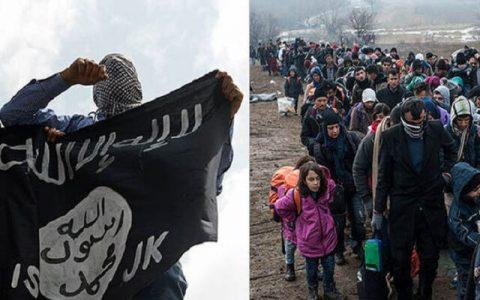
ISIS terrorist group is recruiting refugees by offering $1000 and safe passage to Europe
A study by counter-extremism group Quilliam revealed ISIS is exploiting desperate and underage asylum seekers attempting to make the journey across the Mediterranean with the promise of cash and free travel.
The report also says extremists have infiltrated refugee centres and mosques in Germany in a bid to radicalise disillusioned new arrivals already suffering from “a lack of belief in the host country”.
The fact that ISIS is even suspected of recruiting refugees on their way to Europe ultimately becomes a self-fulfilling prophecy, Quilliam said, as it increases the burgeoning anti-immigrant sentiment within Europe and reinforces the narrative Daesh uses to recruit refugees.
By analysing refugee policies and mapping the journeys taken by refugees towards Europe, Quilliam has produced the first report pinpointing the moments where young refugees are most vulnerable to recruitment by extremists.
The report said: “While some refugees may have to pay smugglers up to $560 for passage towards the Mediterranean coast, IS, capitalising on this route, offer free passage to those willing to join IS.
“IS is able to provide a degree of security. The financial lure is ever-present on the refugee journey – to those reaching the Mediterranean coast, IS offer potential recruits up to $1,000 to join the organisation.
“IS is clearly aware of the value of these refugee routes for the purposes of recruitment and for exporting their operatives into Europe.
“Aside from potentially facilitating access to Europe for IS fighters, the suspicion created by the mere possibility of this is likely to increase xenophobic and anti-refugee sentiment in Europe, reinforcing the narratives that IS uses to recruit both refugees from Syria, Iraq, and Afghanistan, and from Muslim communities in Europe and the West.”
Smugglers and people traffickers were also a threat, the report said, with more than 90 per cent of refugees arriving in the EU using some form of “illegal enterprise” en-route.
This, Quilliam claimed, was “a direct consequence of the fortification of European borders and the small numbers of refugees resettled in the EU directly from refugee camps.”
Unaccompanied minors were particularly at risk of recruitment by extremists, as well as sexual exploitation.
The report said so far 10,000 unaccompanied refugee children had disappeared since arriving in Europe, “many of whom are thought to have fallen into the hands of the very same criminal organisations that brought them into the continent”.
Quilliam also criticised the treatment of young refugees arriving in the UK.
It urged the Government to “treat children as children first” and not as asylum seekers.
“By treating children as asylum seekers, the UK is not fulfilling its obligation to safeguard and promote the welfare of children in the country,” the group concluded.
Mark Brennan, UNESCO Chair in Community, Leadership, and Youth Development said: “Quilliam makes a remarkable contribution to our understanding and efforts to take positive action.
“This report documents in great detail the complexity of the problem, the scope of the youth refugee crisis, and provides a rigorous analysis of the settings, and potential processes, where refugee youth may be drawn into extremist activities.
“This document serves as a critical resource for those seeking to understand the refugee crisis, and a vital reference for policy makers who must create balanced, effective, and evidence informed policies.”
Source: /Express





